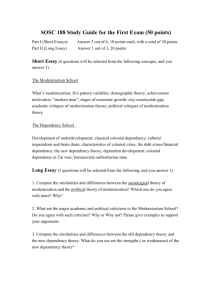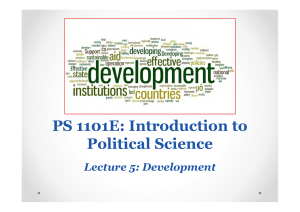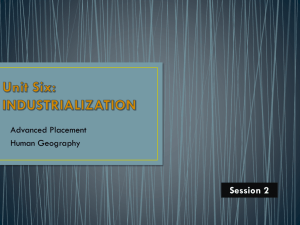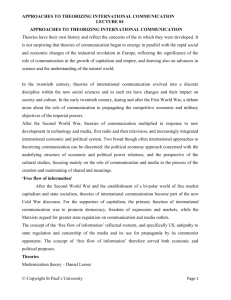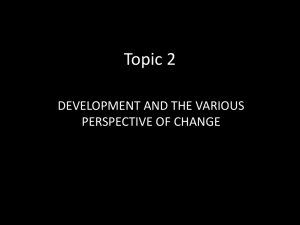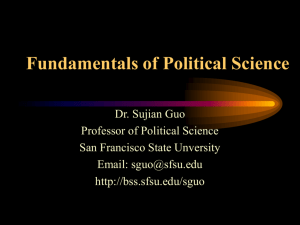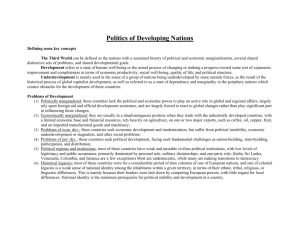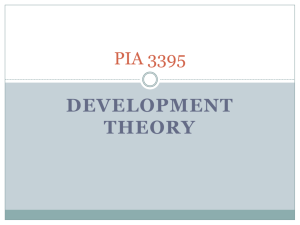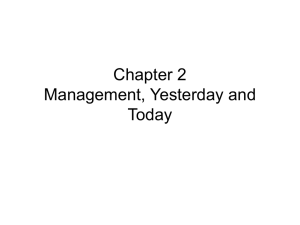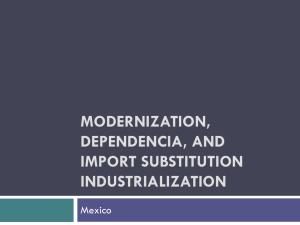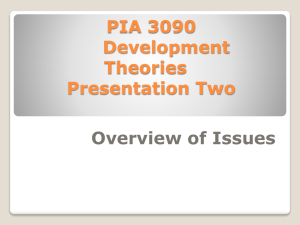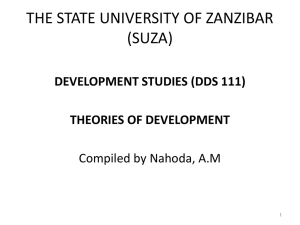Civic Culture - People Server at UNCW
advertisement
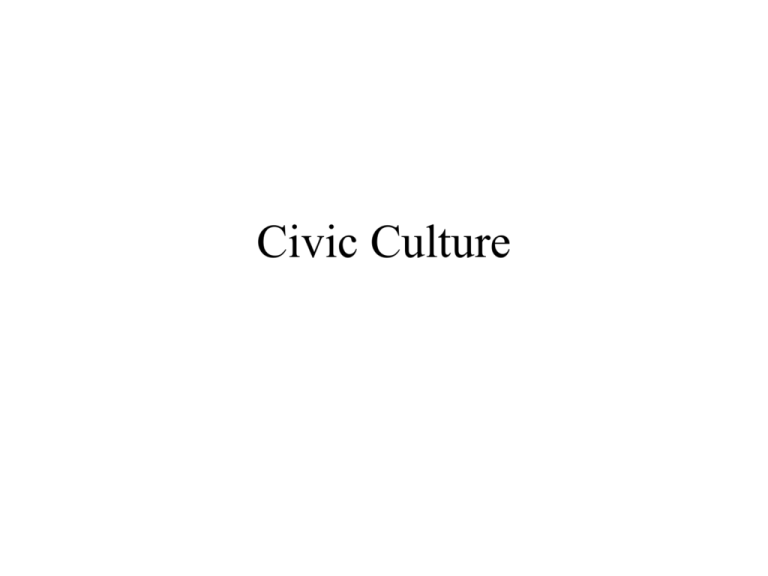
Civic Culture Participation • Democracy - citizens have the right to have influence • Totalitarian - citizens act as parochial subjects • Political Culture is more than institutions of government (executive, legislative, judicial) Civic Culture • a shared culture of political accommodation • pluralistic culture based on communication and persuasion • a culture of consensus and diversity • a culture that permits change but moderates change – combines elements of traditional and modern – emerged first in Great Britain – Other nations with a civic culture: USA, Switzerland, Sweden,Norway, Finland Political Culture • thus refers to specific political orientations attitudes toward the political system and its component parts. This includes attitudes (at the individual level) of the role of self in the system. -political efficacy -political trust "culture" in political culture • Alternatively, political culture can be viewed as a set of orientations toward a special set of social objects and processes. • The "culture" in political culture allows us to examine or include (for consideration) psychological orientations toward social objects. • What, then, is the political culture of a state? – It is that particular distribution of patterns of orientation toward political objects among members (citizens) of the state. What is orientation? • 1) cognitive orientation - knowledge and belief about the political system (roles, inputs, outputs). • 2) affective orientation - feeling about the political system its roles, personnel and performance. (efficacy) • 3) evaluational orientation - the judgements and opinions about political objects that typically involve standards and criteria with information and feelings (trust) How do you evaluate the orientation of a society toward its political system? • 1) What general knowledge do individuals possess about their country & political system? • 2) What knowledge do individuals possess of structures & roles, political elites, policy making? The individual's feelings about these? • 3) What knowledge does the individual have of the downward flow of policy enforcement? (examples: structures/processes, individuals involved?) • 4) How do individuals perceive themselves as members of their political systems? What are individuals' knowledge of their rights, powers, obligations? Out of the evaluation can you score societies and assign a classification? Yes. • Parochial Political Culture – scores zero or near zero on 1-4 – South American tribal societies, societies in remote areas – expectations of change or action initiated by the political system is absent Subject Political Culture • high frequency of orientations toward a differentiated political system • orientations toward self as an active participant approach zero – understands outputs of political system – essentially passive – apt to be affective and normative (knows • institutions exist, accords them limited or no legitimacy - emotional and value judgments dominate - not a cognitive approach). Participant Political Culture • oriented explicitly to the system as a whole and • to both the political and administrative structures and processes of the system • (inputs and outputs). Composition of Orientations • All three can exist simultaneously in a state!!! – Individually: a citizen can be a mix of participant, subject and parochial orientation – Collectively: a given political culture, but especially civic cultures, are a mix of citizens who are subjects, parochials, and participants. What is the effect of economics on culture? • Material-Post Material shift • Material values: emphasis on economic security and on physical security. Those who feel insecure about these needs have a fundamentally different outlooks and political behavior from those who feel secure about them. – war produces both economic and physical insecurity – poor individuals tend to be exposed to both economic and physical insecurity (poverty and high crime rates). Post-material values • emergence of the satisfaction of the physiological needs allows a growing emphasis on nonphysiological needs (higher order needs) – social equality, environmental protection, cultural pluralism, and self-expression • A number of movements have emerged in the modern era that can be classified as satifying higher order needs: – – – – environmental movement women's movement expansion of social and political freedoms demands for equal treatment (ethnicity) Other Theoretical Approaches • • • • Modernization Dependency and Marxism Corporatism Bureaucratic Authoritarianism Modernization • Based on two ideas about social change: – Traditional versus Modern • Folk-urban dichotomy (anthropology) – Theory of Evolution • Social evolution theory: modern (industrial) emerges in stages from traditional (theological/military) • Theory of Stages of Growth – All societies alike at “traditional” stage – eventually they pass through same sets of changes that lead to modernization – Rostow. – Theory modeled on 1st world extended to 3rd world – The application of technology to control nature as engine of growth Dependency and Marxism • Challenge to Modernization Theory • Originated in the debate about Latin American underdevelopment. • Two primary factors: – Underdevelopment – Neo-Marxism • Underdevelopment explanation externalized – System of international free trade at fault – International economy portrayed as divided into a center and periphery – ISI policies recommended as solution Import-Substitution Industrialization • Goal: to move Latin America from an inward to an outward pattern of development • Measures: – Protection for domestic industry (tariff/subsidy) – Structural reforms (land reform/income redistribution) • To expand the power of the internal market for local industry by increasing the purchasing power of peasants and workers • ISI failures – Domestic markets reached limits – MNCs to avoid tariffs established subsidiaries in LA countries (role of foreign capital underestimated) Marxism (Neo) • Leninist view of capitalism was that it would reach its zenith during the imperial era and decline from there • Researchers examining failures of ISI changed the Marxist focus on center countries to periphery nations and how they were impacted by imperialist MNCs (negative) • New Left thinkers with the Cuban revolution noticed peasants, not workers more inclined to revolt. • Perhaps Communism’s two stage approach was limited (bourgeoisie to full cap=alliance with workers to revolution to establish socialism). Neo-Marxism • The duty of revolutionaries was to make revolutions (Che Guevara) • Human will can overcome objective limitations (necessity for full capitalism) • Western imperialism had drained capital and stunted its growth in the periphery nations • Latin America was doomed to stagnate without political revolution. Dependency • Rejected the modernizationists’ contention that certain that certain cultural and institutional features caused underdevelopment • Global approach linking internal and external factors • Insertion into global econ during imperial era shaped the region’s economic growth (international division of labor imposed by west) • No comparative advantage • Center gained at expense of periphery which constrained economic potential of Third World Dependency • A situation in which the economy of a certain country is conditioned by the development and expansion of another economy to which the first nation is subjected. • Interndependent relationship is constrained into dependency when only one of the two nations is able to grow its economy and the other nation is able only to grow as a reflection of the others expansion. Corporatism • A theory of community and the state. – organic state tradition – stresses the political community, functional associations, and the role of the state in promoting the common good. • Assumes that the preferred form of political life is an association of individuals as members of a community. – Liberalism emphasizes individual self-interest – Marxism emphasizes mode of production/class struggle • Political institutions are a natural organic element of society. • Institutions must be infused with authority to fulfill proper roles Corporatism • The state the most perfect form of political community – The component parts of the state: family, private associations, churches, clubs, interest groups – All have a role/proper function to which they are intimately connected. • The role of the state and its morality (to govern with a view to the common interest) are central. • In opposition to: – Marxism (in violation of the harmonious community idea) – Liberalism/Capitalism (antagonism between classes and the idea of the weak state) • Finally, the public common interest dominates the private individual interest New Corporatism • A system of interest representation in which the constituents are organized into a limited number of singular, compulsory, noncompetitive, hierarchically ordered and functionally differentiated categories, recognized or licensed by the state (but not created) and granted a deliberate monopoly within their respective categories in exchange for observing certain controls on their selection of leaders and articulation of demands and supporters. (Schmitter) Critiques • An apology for fascism • Overly dramatic/rigid definition of class conflict • Implicitly accepting the traditional/modern dichotomy of Modernization Theory (why is this bad?) • Theory stresses cultural values as key therefore is it really a significant departure from Modernization? Bureaucratic Authoritarianism • Emerged as an attempt to understand militarization of government in South America during the 1960s and 1970s. • Militaries emerged in this time as governing institutions with a plan for accelerating industrial growth (foreign investments, control over suffrage, wage controls) • Draws on Modernization, Dependency and Corporatism • Primary hypothesis: That in late-developing countries more advanced levels of industrialization might actually coincide with the collapse of democracy and an increase in inequality. Steps to Authoritarianism • Economic stagnation (possibly collapse) – Usually during developmental process • Increasing demands on government from citizens – resolve the economic situation • Political inability • Coalition of private, government, citizens look to military for solution O’Donnell’s B.A. • O’Donnell is a product of the modernization
